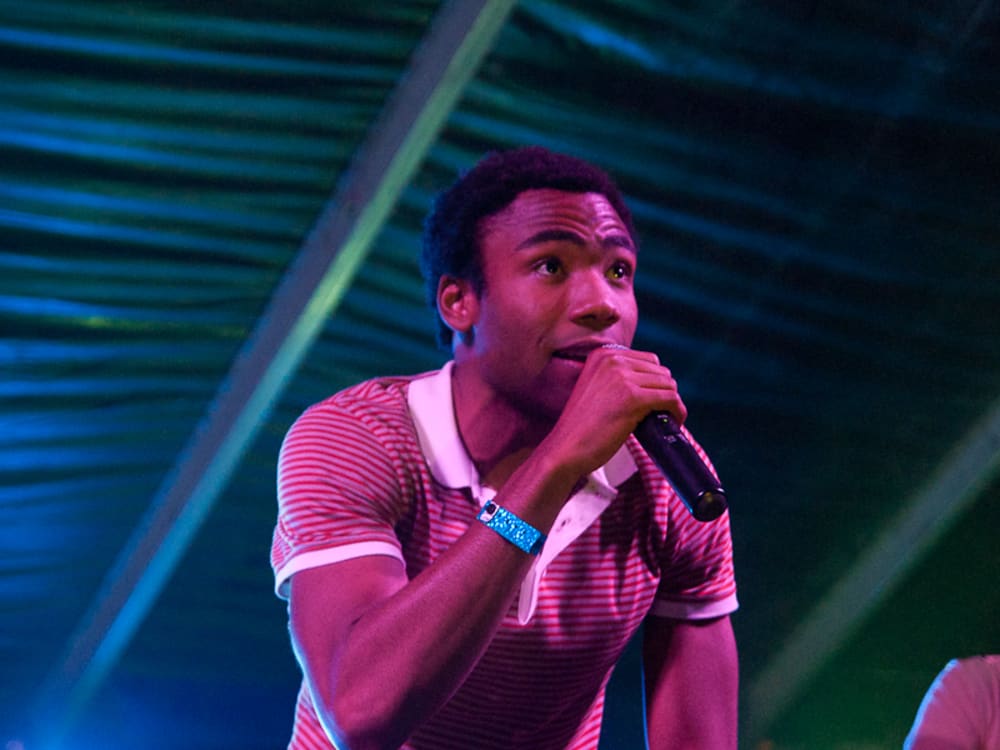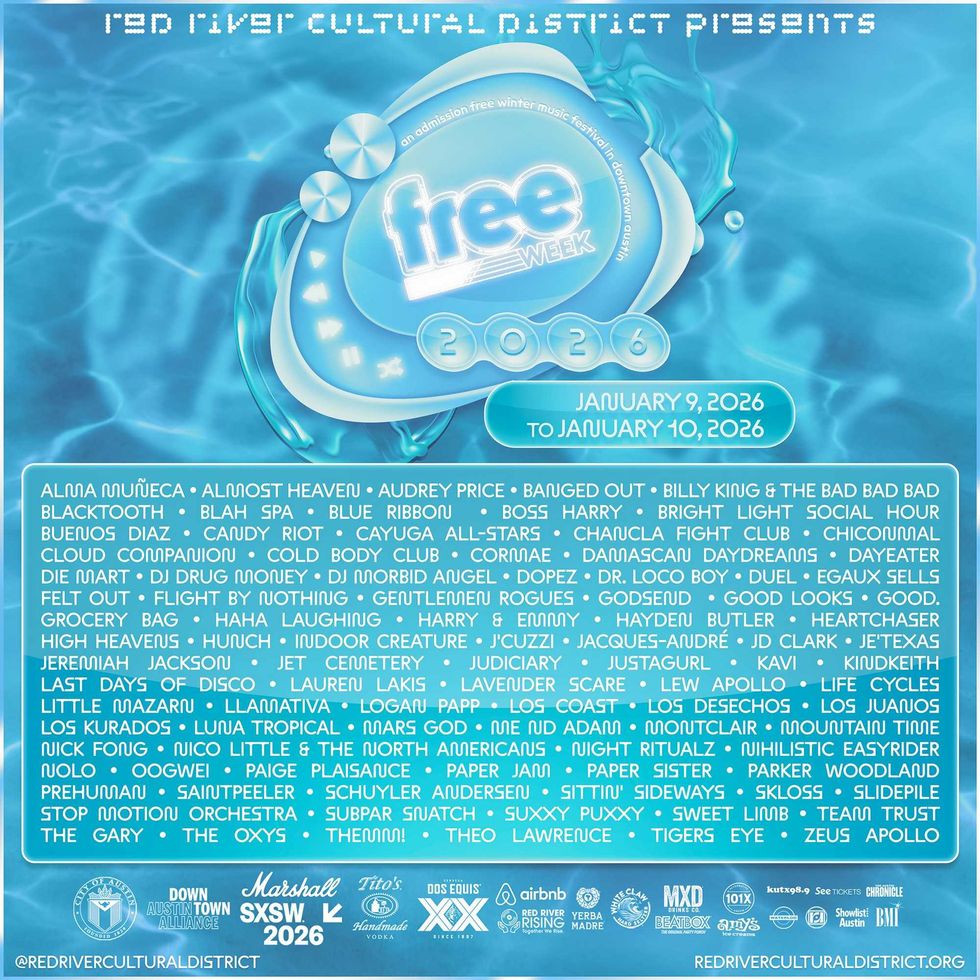debate it
Did Fun Fun Fun Fest standout Childish Gambino deserve today's brutal Pitchforkreview?
 Childish GambinoPhoto by Bill Sallans
Childish GambinoPhoto by Bill Sallans Photo by Bill Sallans
Photo by Bill Sallans Photo by Bill Sallans
Photo by Bill Sallans
Donald Glover, the comedian/writer/musician/actor/who-knows-he-probably-owns-a-small-chain-of-Asian-fusion-restaurants-or-something whose rap project, Childish Gambino, took Fun Fun Fun Fest by storm last month, has probably not had the best few weeks since the festival.
Community, the low-rated NBC sitcom on which he stars, is about to be yanked from the airwaves indefinitely (though the network claims it’ll return), and today, Camp, his debut full-length album as Gambino received an absolutely brutal review on Pitchfork, in which the massively influential music website offered it a devastating 1.6 rating, out of a possible 10.
There’s a lot of criticism of Pitchfork out there (at least two different websites, Pitchfork Reviews Reviews and Ripfork, have been devoted strictly to covering the site’s influence on pop culture), and it’s true that assigning a numerical grade to a piece of art is inherently ridiculous (it'd be great to see the math that the review’s author, Ian Cohen, used to determine that 1.5 and 1.7 were too low and too high, respectively). But offering a rating like that isn’t about specifics, it’s about making a point: This record sucks, the score says, and we are not interested in being ambiguous about it. It’s a statement with a clear agenda.
This record sucks, the score says, and we are not interested in being ambiguous about it. It’s a statement with a clear agenda.
And Pitchfork has been successful in using these low scores to torpedo the careers of their subjects. Travis Morrison, the former frontman for the 90s indie rock heroes The Dismemberment Plan, credits the site’s 0.0 review of his 2004 solo album Travistan with driving him out of music.
“I just got the sense [Pitchfork] thought I was a rock star, and they wanted to take me down a peg, but I don’t think it occurred to them that the review could have a catastrophic effect,” Morrison told the Washington Post in 2006.
The album was subsequently yanked off college radio playlists, tickets on his solo tour struggled to move and a record store here in Texas (the Post doesn’t name which one) refused to stock the CD. Morrison announced his retirement from music in 2009, and aside from a brief reunion with the Dismemberment Plan, dedicates his time to his day job at the Huffington Post.
It’s possible that with Morrison, the site was unaware of the impact such a bad review could have. But in 2011, seven years on from Travistan, there’s no chance that the 1.6 review for Childish Gambino’s Camp wasn’t written, in part, to discredit Glover’s rap career.
But it’s also true that Camp is not a good album. The Childish Gambino live act is energetic and exciting, but on record, the schtick is stale and hard to get through.
Most rappers use personas: Jay-Z may belong to the world, but Shawn Carter has a little bit of breathing room. But Donald Glover, actor/comedian, and Childish Gambino, rapper, are both public figures, which means that Gambino is Glover cranked to 11. And that persona is flimsy: essentially, he’s a horndog who proudly objectifies women, while claiming to fill the need for “smart middle-class black kids [who] need a role model,” and defiantly standing up to the dominant, thugged-out, gangster-based rap culture.
All of that sounds hard to swallow, and that’s even before you consider the main thrust of the Pitchfork review, which is that the stereotypical hard gangsta rapper hasn’t exactly been in vogue over the past few years. (Of the Top 10 singles on the Rap/R&B chart at the moment, three of them feature the half-Jewish Canadian former child star/rapper Drake; the top two spots are a duet between Jay-Z and Kanye West, who rap largely about business plans and loneliness, and a Beyonce track featuring the cerebral Andre 3000. Meanwhile, acts from Das Racist to Lil B and Odd Future have spent the past year stretching what a rap star can look like in 2011.) So, even if you believe the Gambino persona, it’s hard to argue it’s particularly relevant.
That’s the track that the Pitchfork review follows: basically, in a post-Kanye West rap culture, is there a need for Childish Gambino? And since there’s not, why is this dude acting like he just invented sandwiches?
I had the opportunity to interview Glover during SXSW, where he hosted the MTV Woodie Awards at the Austin Music Hall. He was really defensive when I asked him about his persona. He talked about how he “grew up on Eminem and 50 Cent,” and I got the feeling that he still saw the rap world the way that it was when he was in high school — that because he didn’t have a Kanye West around when he was growing up, it might not have occurred to him that there’s a pretty famous one here right now.
A guy whose stand-up material is thoughtful about a culture that can be tough on women is not someone that I’d expect to threaten to mouth-rape people who are critical of the misogyny in his music that he personally acknowledged when I asked him about it.
He defended his work’s misogyny with comparisons to other artists and half-hearted deflections (“It sometimes can be crazy and misogynistic and unfair, but so is life,” he insisted, and his publicist pulled him away to take care of a quick stage task as I started asking a follow-up). He generally seemed uncomfortable with the line of questioning. On Camp, he’s opposes it more overtly: “You better shut your mouth before I fuck it,” he raps to a critic who claims that she "wrote about rape culture" in the song “Backpackers.”
It’s weird. A guy whose stand-up material is thoughtful about a culture that can be tough on women is not someone that I’d expect to threaten to mouth-rape people who are critical of the misogyny in his music that he personally acknowledged when I asked him about it.
But that cuts to the core of what makes Childish Gambino the sort of dubious project that warranted a 1.6 Pitchfork review: the persona isn’t just irrelevant, it’s obvious in how much it postures. And since the core theme of the record is all about how Glover is the one guy who’s going to offer you realness even if it’s ugly, the realization that it’s all dishonest is a bummer.
It’s possible that Glover’s rap career will survive the devastating Pitchfork review. It’s even possible, if he continues to grow as a live performer, that there’ll be things to look forward to from Childish Gambino. But regardless of whether Pitchfork deserves the career-breaking power that it possesses, it’s hard to argue that Childish Gambino isn’t a deserving target for it.

 Free Week 2026 lineup.Graphic courtesy of the Red River Cultural District
Free Week 2026 lineup.Graphic courtesy of the Red River Cultural District